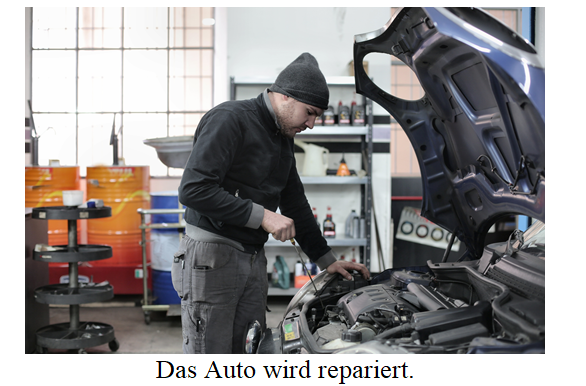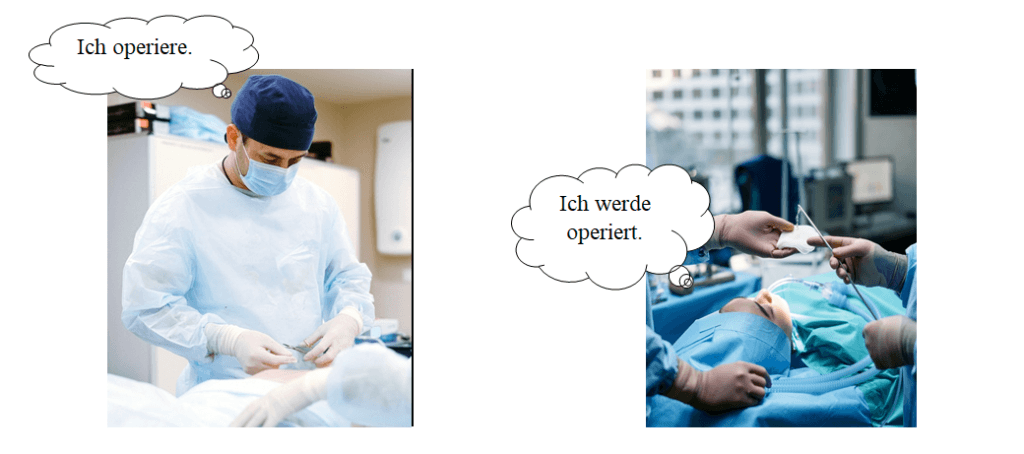In this lesson, you will find out all important information about German passive voice. What is sein-passive and what is werden-passive . How it is formed and when it is used. Using the passive voice in German is really useful. It helps you explain how things are done, describe work and production processes, give instructions, outline rules and regulations, and make general statements.
Thank you for reading this post, don't forget to subscribe!CONTENT
German passive
Werden – Passive
Usage of the passive tenses
Transitive verbs and passive
Transforming active into passive
Using von, mit and durch
Indefinite pronoun man
Forming passive
Verbs not used in passive
Dative, genitive and prepositional objects
Sein-passive and warden-passive-difference
Werden-Passive OR Sein-Passive

German passive
The German Passive is a way of saying things in passive voice, where the focus is on what’s happening to the subject instead of who’s doing it. It’s helpful when you either don’t know who’s behind the action or when it really doesn’t matter.
For example
Ich werde operiert. – I’m having an operation.
Der Kuchen wird gebacken.– The cake is being baked.
Unsere Wohnung wird renoviert. – Our flat is being renovated.
Das Wasser wird für drei Tage abgestellt. – The water is turned off for three days.
There is no performer of the action in the sentences above. But If we want to say who is performnig the action, we can use prepositions von.
For example:
Ich werde von dem Artzt operiert. – I am being operated on by the doctor.
Der Kuchen wird von meiner Oma gebacken. – The cake is baked by my grandma.
There are two types of passives:
Werden – Passive (das Vorgangpassiv) and Sein – Passive (das Zustandspassiv)

Click on:
Grammar Contents
Werden – Passive (Werden + Partizip II)
The werden- passive is formed by the auxiliary verb werden in the appropriate tense and the perfect participle of the main verb. The perfect participle of the verb werden in the passive has the shortened form worden.
Formel
werden + perfect participle = werden – passive
Usage of the passive tenses
The use of the passive tenses is in general the same as in the active. There is some slight variation in use in a few instances:
- The future tense is little used in the passive, and the present tense is preferred unless there is a risk of being misunderstood.
For example:
Das Gebäude wird nächste Woche renoviert. The building will be renovated next week.
Das Gebäude wird renoviert. The building is being renovated.
Das Gebäude wird renoviert werden. The building will be renovated.
In the first sentence, the phrase “nächste Woche” makes it clear we’re talking about the future, so using the present tense works just fine. But it’s pretty rare to hear the future tense used in passive voice in the sentence like this. It sounds a bit off.
But if there’s no time reference, like in the second sentence, the present tense would be taken as referring to now. In those cases, to clarify the time reference, we should use the future tense, like in the third sentence. - The past tense of the passive is quite common in both written and spoken German.
Transitive verbs
The werden-passive can be formed from most transitive verbs, which are verbs that take a direct object in the accusative case.
In the passive construction, the direct object of the active verb becomes the subject.
Some transitive verbs cannot be used in the werden-passive voice in German. This group includes certain verbs related to knowing, containing, possessing, and receiving, specifically: bedeuten (mean), bekommen (get), besitzen (possess), enthalten(contain), erhalten (receive), haben (have), kennen (know), kriegen(get), umfassen(include), and wissen(know).
These verbs do not have passive forms in German, even though their English equivalents might. Instead, other constructions are used for these verbs, primarily active forms of another verb or a construction with “man.”
For example:
Man wusste nicht, ……
Man bedeutet ….
No passive can be formed with the verbs of perception followed by a bare infinitive. These verbs can be used in the passive with an ‘-ing’ form in English, but equivalent sentences in German have other constructions, usually with the active voice:
For example:
Man hörte ihn singen. – He was heard singing.
Der Pförtner sah sie das Gebäude eintreten. – She was seen entering into the building by a doorman.
The passive voice can be formed by transitive verbs, with certain exceptions such as: bekomen, erhalten, empfangen, haben…
If you want to find out more click on lesson:
Intransitive verbs, such as: lachen, tanzen, singen..., can form the impersonal passive (passive with the word es), while reflexive and modal verbs, as a rule, cannot form the passive voice.
For example:
Die Leute lachen. – Es wird gelacht.
Die Leute tanzen. – Es wird getanzt.
Die Leute telefonieren.- Es wird telefoniert.
These sentences does not have an accussative object, thats why they beginn with es.
Transforming active into passive
When transforming an active sentence into a passive one, the subject is often omitted. However, you can include the subject if you wish by using “von” , “mit” or “durch.” In this process, the object of the active sentence becomes the subject in the passive version.

For example:

Active Voice: Der Arzt operiert den Patienten. – The doctor operates on the patient.
Passive Voice: Der Patient wird (von dem Arzt) operiert. – The patient is operated on (by the doctor).
In the active sentence, “Der Arzt” (The doctor) serves as the subject. In the passive sentence, the subject is omitted.
The object in the active sentence is in the accusative case. When we convert it into the subject of a passive sentence, this object becomes the subject in the nominative case. For example, “den Patienten” (the patient) changes to “der Patient” (the patient) in the nominative case. If we still want to identify the performer of the action, we can do so by using the prepositions “von,” “durch,” and “mit.”
Using von, mit and durch?
von (+ dative) : ‘is used for persons and institutions, and when indicating the perpetrator of the action: vom Arzt (by the doctor), vom Europäischen Rat (by the European Council)
durch (+ accusative) : ‘is used for events and agents of an action when it is only an intermediary: durch den Blitz (by the lightning), durch den Bote (by the messenger)
mit (+ dative) :‘is used for instruments, it can be used instead of durch: mit der neuen Technologie (with the new technology), mit Solarenergie (with solar energy)
Indefinite pronoun man
If the subject of the active sentence is the indefinite pronoun man, the subject of the passive sentence is omitted. Then the passive sentence can start with es or some other sentence element. Es does not agree with the personal verb form.
Active: Man arbeitet sonntags nicht.
Passive: Es wird sonntags nicht gearbeitet.
Sonntags wird nicht gearbeitet.
Forming passive
When forming the passive in German, there are differences between werden-passive and sein-passive . To describe an action with a werden-passive, you need the auxiliary verb werden, which changes by person, and the participle II of the main verb.
For example:
Das Mittagessen wurde auf den Tisch gestellt.- The Lunch was placed(put) on the table.
Das Mittagessen wird gegessen. -The lunch is eaten.
To describe a state using the sein-passive, you need the auxiliary verb sein, which changes by person, and the participle II of the main verb.
For example:
Das Mittagessen war gekocht gewesen.- The lunch had been cooked.
Das ganze Mittagessen ist schon aufgegessen. – The whole lunch has already been eaten.
Werden- passive ( werden + particip II)
Look at the table an example of how the process passive is formed in different tenses in the German language.
| tenses | warden- passive |
| present | Das Mittagessen wird zubereitet. |
| past | Das Mittagessen wurde zubereitet. |
| perfect | Das Mittagessen ist zubereitet worden. |
| pluperfect | Das Mittagessen war zubereitet worden. |
| future I | Das Mittagessen wird zubereitet werden. |
| future II | Das Mittagessen wird zubereitet worden sein. |
Sein – passive (sein + Particip II)
You can also form the passive state in different tenses. You can see how this works in the table.
| tenses | indicative | sein-passive |
| present | Mia bereitet das Mittagessen zu. | Das Mittagessen ist zubereitet. |
| past | Mia bereitetete das Mittagessen zu. | Das Mittagessen war zubereitet. |
| perfect | Mia hat das Mittagessen zubereitet. | Das Mittagessen ist zubereitet gewesen. |
| pluperfect | Mia hatte das Mittagessen zubereitet. | Das Mittagessen war zubereitet gewesen. |
| future I | Mia wird das Mittagessen zubereiten. | Das Mittagessen wird zubereitet sein. |
| future II | Mia wird das Mittagessen zubereitet haben. | Das Mittagessen wird zubereitet gewesen sein. |
Verbs not used in passive
We previously noted that the passive voice can be formed using transitive verbs, which have a direct object in the accusative case. However, some verbs cannot be used in the passive voice; these are primarily intransitive verbs that do not take a direct object. Examples of such verbs include:
- Verbs which form perfect tense with sein: gehen, laufen, kriechen, rennen, fahren, …
- Reflexive verb: sich ärgern, sich beeilen, sich freuen, sich waschen, …
- Verbs with the object in accusative case which marks a body part
- Modal verbs
- Verbs which point to the posession- bekommen, besitzen, empfangen, erhalten, haben, …
- Functional and impersonal verbs* – in Ordnung bringen, Spaß machen, es gibt, es regnet, …
- Other verbs- wissen, kennen, kosten, …
Click on:
Grammar Contents
Dative, genitive and prepositional objects and the passive
In German only the accusative (direct) object of a transitive verb can become the subject of a passive sentence. This is different to English and means that a dative object, a genitive object or a prepositional object can NEVER become the subject of a passive sentence in German.
Verbs with dative objects
If you use a verb that takes a dative object in the passive voice, the dative object stays in the dative case. This is true for verbs that use the dative and don’t have an accusative object.
For example:
Mia half ihm beim Lernen. → Ihm wurde beim Lernen geholfen.
Mia helped him with his studies. → He was helped with his studies.
You don’t have to put the dative object in the first position before the verb, but if you decide to place it later in the sentence, which changes the emphasis a bit, you need to start with the pronoun “es” Here are two different ways to do this that are both acceptable:
For example:
Mir wurde geraten, nicht so schnell zu fahren.
Es wurde mir geraten, nicht so schnell zu fahren.
I was advised not to drive so fast.
Verbs with an accusative and a dative object
In German, when you have verbs that take both an accusative object and a dative object, the passive voice keeps the dative object in the dative case. This is because, in German, only the accusative object can take the spotlight as the subject of a passive sentence.
In contrast, English allows some flexibility. With certain verbs that have two objects, you can make either the direct or the indirect object the subject in the passive form.
For instance, in the sentence “He gave his father the present,” you can create two different passives: one with “the present” as the subject and another with “the father” as the subject.
For example:
Das Geschenk wurde dem Vater gegeben. – The present was given to the father.
Dem Vater wurde das Geschenk gegeben. – The father was given the present.
The direct object das Geschenk can be the subject of the passive sentence in German, as in English, but not the indirect (dative) object dem Vater, which must remain in the dative case in German.
A dative object can become the subject of a passive construction with bekommen or kriegen.
The sein-passive
The sein-passive is formed by the auxiliary verb sein in the appropriate tense and the past participle of the main verb. The perfect participle of the verb werden in the passive has the shortened form worden.
Formel
sein + past participle = sein – passive
Sein-passive describes state or result of an action. It can be often replaced with the sein + adjective.
For example:
Das Handy ist ausgeschlossen. – Das Handy ist aus.
Das Fenster ist geöffnet. – Das Fenster is ofen.
Die Tür ist geschlossen (zugemacht). – Die Tür ist zu.
In reality, only a few tenses and moods of the sein-passive are commonly used. People tend to stick with the past tense instead of the perfect tense, although you might hear the perfect tense in casual conversation or see it in writing now and then.
Besides the past tense, the present tense is also in common use.
The future tense is pretty rarely used.
Differnece between the werden- passive and the sein -passive
The Werden-Passiv is used to emphasize the process or action itself, where the perpetrator of the action is not important.
For example:
Das Fenster wird geöffnet. – The window is opened.
→ In this case, it is irrelevant who opened the window; the focus is on the fact that it was opened. If you want to mention the person who performed the action, use the preposition “von” with the dative case.
For example:
Das Fenster wird von der Lehrerin geöffnet. – The window is opened by the teacher.
On the other hand, when an action is completed and you want to describe the resulting state, use the sein- passive (sein+Particip II).
For example:
Das Fenster ist seit einer Stunde geöffnet. – The window has been opened for an hour.
→ Here, the focus is on the state of the window after the action has taken place.
Tips for Using Werden-Passive or Sein-Passive
When you’re diving into German, it helps to know a few things that can guide you on whether to use sein-passive or werden-passive.These tips can make it easier to pick the right passive form when you’re writing or speaking.
- The werden-passive typically corresponds to an English progressive tense, whereas the sein-passive does not. This is particularly true in the present tense.
For example:
Das Haus wird repariert .- The houseis being repaired.
Die Briefe werden gerade verschickt. – The letters are being sent out. - In English, you can use “get” to create a passive voice. If you use a “get” passive in a specific context in English, the German word “werden” is often what you’d use, since it can mean “get” in other situations.
For example:
Dieses Haus wurde letzte Woche repariert. – This house got/was repaired last week.
Dieses Einkaufszentrum wird nächste Woche geschlossen. – This shopping mall is getting/will be closed next week. - The sein-passive refers to a state that results from a previous action, making its meaning similar to that of the perfect tense. The perfect tense often expresses a result. This means that sentences using these structures can be quite similar in meaning.
For example:
Das Gebäude ist gebaut. / Das Gebäude ist gebaut worden. -The building has been built
Das Haus war zerstört. / Das Haus war zerstört worden. - For example, the natural English equivalent of a German Sein-Passiv is often in the perfect or pluperfect tense instead of the present or past tense.
For example:
Das Handy ist repariert. – The cell phone has been repaired.
Der Wagen war gewaschen. – The car had been washed. - However, there’s a difference between the sein-passive, which shows an ongoing state, and the perfect of the werden-passive, which focuses on an action happening at a specific time.
For example:
Das Geschäft ist seit langem geschlossen. – The shop has been closed for a long time.
Das Geschäft ist vor langer Zeit geschlossen worden. – The shop was closed a long time ago.
Das Haus war jahrelang renoviert. – The house was renovated for years.
Das Haus war vor Jahren renoviert worden. – The house had been renovated years ago. - Since the passive voice of being expresses a state that results from a previous action, it can only be used with verbs whose action has a clear result, like: bauen (build) , begraben(bury), beunruhigen(disturb), brechen(break), öffnen(open), reparieren(repair), schreiben(write), verletzen(injure), waschen(wach), zerstören(destroy), etc.:
For example:
Mein Bein ist verletzt. – My leg is injured.
Das Eis ist gebrochen. – The ice is broken.
So here we can see the resulting injuries or damage. - By contrast, verbs whose action produces no tangible or visible result, like bewundern (admire) or zeigen (show), cannot be used in the sein-passive at all, as admiring or showing do not involve any kind of result. Other verbs which typically cannot be used in the sein-passive include: anbieten (offer) betrachten (look at) brauchen (need) loben (praise) begegnen (meet) bemerken (notice) erinnern (remind) sehen (see)
See more:

